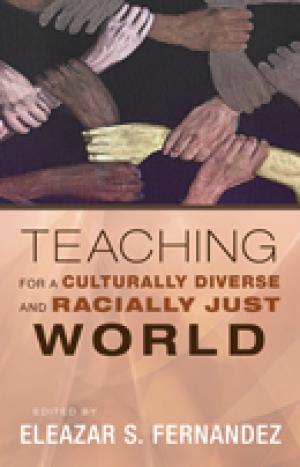Resources
A forum on race and teaching theology and religion, launched in the wake of the August 2014 shooting of Michael Brown and subsequent protests and police response in Ferguson, Missouri, but framed more broadly to encompass teaching for racial and social justice, dismantling the structures of white privilege in academia, and diversifying the faculty, the students, and the canon.

Click Here for Book Review Abstract: There is still resistance in Christian institutions to interreligious dialogue. Many feel that such a practice weakens Christian faith, and promotes the idea that Christianity is merely one among many different religious options. When it comes to higher education, there is the fear that both college and seminary students will “lose their faith” if they are invited to study other religious traditions from a positive perspective. Unfortunately, this attitude belies the current culture in which we live, which constantly exposes us to the beliefs and practices of others. Kristin Johnston Largen sees this setting as an opportunity and seeks to provide not only the theological grounding for such a position but also some practical advice on how both to teach and live out this conviction in a way that promotes greater understanding and respect for others and engenders a deeper appreciation of one’s own faith tradition. Largen’s synopsis of interreligious education and suggested action includes contributions by Mary E. Hess and Christy Lohr Sapp. Hess and Sapp provide practical commentary regarding the successful implementation of Largen’s proposed approach. As a group, Largen, Hess, and Sapp create a text that extends pedagogical innovation in inspiring but practical ways. (From the Publisher)
A survey of 36 leading seminaries and rabbinical schools, evaluated on criteria for a sexually healthy and responsible seminary. These criteria measure sexuality content in the curriculum; institutional commitment to sexuality and gender equity (e.g., the existence of anti‐discrimination, sexual harassment and full inclusion policies); and advocacy and support for sexuality‐related issues.
The OpEd Project scouts and trains  under-represented experts to take thought leadership positions in their fields, connecting them with a national network of high-level media mentors, and channeling the best new experts and ideas directly to media gatekeepers who need them, across all platforms.
This free, online tutorial contains 10 modules, each explaining how to better design course materials for learners with physical and cognitive disabilities. Tutorials include: accessibility issues on online learning, and making more accessible PowerPoint presentations, videos, Word and Excel documents, PDFs, Web pages, and Web scripts.
Advocating that disability be valued as a form of diversity, Adams summarizes some of the less-obvious ways that campuses and classrooms stigmatize disability and in other ways fail to welcome the physically and cognitively disabled.
In this series, Williams provides annotated links to resources for building Web and other digital resources that are appropriately accessible to learners with physical or cognitive disabilities.
In this series, Williams provides annotated links to resources for building Web and other digital resources that are appropriately accessible to learners with physical or cognitive disabilities.

Click Here for Book Review Abstract: Cultural and ethnic diversity is the reality of our world, and much more so in this age of heightened globalization. Yet, do our ways of doing theological education match with our current reality and hopes for a colorful and just tomorrow? How shall we do theological formation so it helps give birth to a culturally diverse, racially just, and hospitable world? This edited volume gathers the voices of minoritized scholars and their white allies in the profession in response to the above questions. More particularly, this volume gathers the responses of these scholars to the questions: What is the plight of theological education? Who are the teachers? Who are our students? What shall we teach? How shall we teach? How shall we form and lead theological institutions? It is the hope of this volume to contribute to the making of theological education that is hospitably just to difference/s and welcoming of our diverse population, which is our only viable future. When we embody this vision in our daily educational practices, particularly in the training of our future religious leaders, we may help usher in a new, colorful, and just world. (From the Publisher)
A brief list of current book series publishing scholarship on Asian and Asian-American topics.